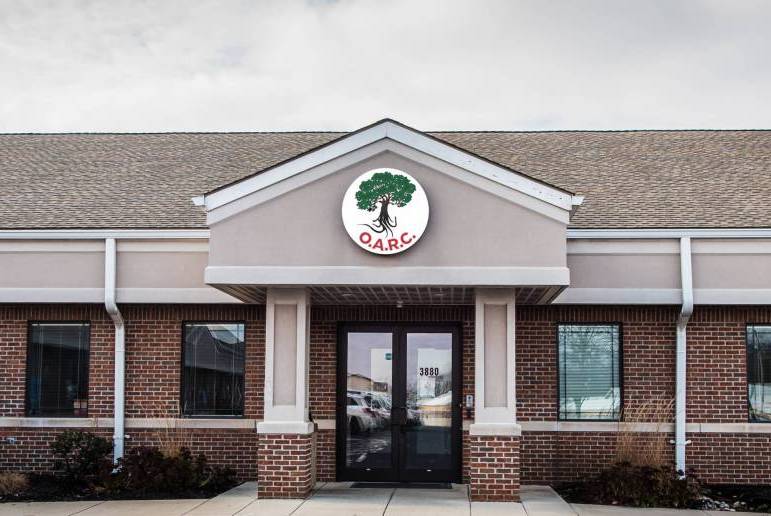Private Insurance Policies Accepted at Ohio Addiction Recovery Center

Top Rated & Accepts Most Major Insurance Plans

Your commercial health insurance could cover up to 100% of the cost of treatment. We’re in-network with most private insurance plans, which means your out-of-pockets costs could be much lower than other options in Ohio – without sacrificing treatment quality.
Some popular plans we are in-network with include:
Not listed? Want to learn what your insurance covers? Call now to determine costs of treatment.
Insurance & Addiction Treatment Cost Calculator
The cost of addiction treatment can vary depending on your level of care and specific insurance policy. You can check your insurance coverage by using our tool below. Whether you’re interested in our Columbus detox center or residential rehab, we’ll be able to let you know what your plan covers, in-network costs vs out-of-network costs, deductibles, co-pays, or any other out-of-pocket fees associated with your health insurance. This is 100% confidential and will not affect your policy. We can even let you know what your plan covers at other facilities.
Will My Insurance Pay For Drug & Alcohol Rehab?
Yes, thanks to federal law, health insurance companies are required to cover at least a portion of drug and alcohol rehab as an essential health benefit. However, the level of care and which facilities are covered are determined by your insurance provider. The first step is to have an assessment. With an assessment, our specialists can let you know if you qualify for inpatient treatment, what your policy covers, and whether you need to choose an in-network facility.
If our medical team believes you would benefit from inpatient rehab and you would like to be admitted to our facility, a claim is submitted to your insurance provider for approval. Even if your insurance company does not approve a claim for inpatient rehab, they usually recommend a lower level of care, such as partial hospitalization (PHP), intensive outpatient (IOP), or outpatient counseling. That said, because inpatient treatment has the highest success rates, we always fight for our clients who would benefit from it and typically can get claims approved.
Will I Have Out-Of-Pocket Costs For Rehab?
Not always. Many of our clients find that their inpatient rehab stay is completely covered by their health insurance. Any out-of-pocket costs will depend on the specifics of your policy. Some clients are responsible for cost-sharing before their insurance coverage activates, such as copays, coinsurance, deductibles, or their out-of-pocket maximum. It’s best to call our specialists at 800-481-8457 to check the specifics of your policy and what options are available. We work with our clients to ensure finances are not a barrier to treatment.
Some of our clients choose our self-pay option. Typically these individuals are uninsured, underinsured, or have a state-funded policy that we can’t accept. Learn more about out-of-pocket costs, pricing, and self-pay at OARC.
For the lowest out-of-pocket costs, it’s essential to find a rehab that is in-network with your insurance plan.
How Do I Find A Rehab In-Network With My Insurance?
Like any other medical service, most insurance companies have an online portal or a list of in-network providers by request. You can also call your insurance company to find a rehab or detox near you that is covered by your plan.
Alternatively, you can call a treatment center directly and ask which insurance providers they are in network with. Depending on your plan, you may have out-of-network benefits as well, but this usually requires higher out-of-pocket costs. Unlike most facilities, we are in-network with most commercial insurance plans through an employer or the military. This guarantees the lowest out-of-pocket costs for our clients.

Popular Insurance Plans That We Accept
If you have insurance coverage through your employer, then you likely have a plethora of quality options for addiction treatment. Depending on the severity of your addiction, inpatient hospitalization may be required, which often brings high out of pocket costs without insurance.
Thanks to privacy laws, you can use your employer’s coverage without fear of judgment or discrimination based on your health conditions, including addiction. Common insurance plans used for addiction treatment include:
Ohio Rehabs That Accept Cigna
Ohio Addiction Recovery Center is proud to be in-network with Cigna. Being a full continuum of care treatment center, OARC provides medical detox, residential rehab, and outpatient addiction services. Depending on your exact policy terms, Cigna could pay for all or most of your addiction treatment.
To learn your full benefits, it’s best to contact us. Our specialists can let you know if there are any out of pocket costs such as co-pays, co-insurance, or deductibles. We’re also happy to offer flexible payment plans for any costs not covered by your Cigna plan. Our aim is to limit as many barriers to treatment as possible, so never hesitate to give us a call at 800-481-8457.
To find other drug rehabs that accept Cigna, it’s best to call Cigna or use their online portal. Alternately, if you aren’t a fit for our program or Cigna won’t cover our level of care for your situation, our specialists can help refer to a program that accepts your plan.
Drug Rehabs That Take Blue Cross Blue Shield
Blue Cross Blue Shield is one of the largest health insurance providers in the United States. Nearly 1 in 3 Americans rely on BCBS for health coverage. Ohio Addiction Recovery Center is proud to be in-network with BCBS to provide medical detox and inpatient rehabilitation, among other addiction treatment services.
To learn your full benefits and coverage with our program, contact us now via chat, call, or contact form. We’d be happy to provide a complimentary benefits check and make referrals if need be if you aren’t a fit for our program.
Drug & Alcohol Rehab That Accepts Aetna
Aetna is another popular insurance provider that we’re happy to be in-network with. Aetna provides excellent coverage for addiction treatment services and could even require zero out of pocket costs for you depending on your plan. Many clients with us use Aetna to cover detox all the way through rehab and aftercare, which can be several months total of treatment.
Ohio Rehabs That Accept United HealthCare
At Ohio Addiction Recovery Center, we’re proud to be in-network with United HealthCare and other UHC plans, such as United Behavioral Health and Optum. UHC offers excellent addiction treatment coverage. It’s best to contact us to speak with a specialist that can examine your full benefits. If you aren’t a fit for our program, we can provide referrals to programs that are in-network with United HealthCare.
In-network Ohio Healthy / Optima Addiction Treatment
Ohio Healthy is an Ohio-specific health plan. Sometimes it can be difficult to find a fully integrated addiction treatment center that offers a full continuum of care covered by Ohio Healthy. At Ohio Addiction Recovery Center, we’re proud to be in-network with Ohio Healthy (Optima). Not just that, but Ohio Healthy has excellent coverage for addiction treatment. If you have Ohio Healthy/Optima, your entire treatment cost could be covered by your insurance plan. Call us today to check your Ohio Healthy SUD treatment benefits.
Humana In-Network Addiction Treatment
Humana is a large insurance provider, covering over 13 million people in the US. Humana offers a variety of plans to cover clients with different needs. Though most Humana plans have addiction treatment benefits, the exact coverage can vary considerably depending on the plan. Humana rarely has out-of-network benefits, so it’s important to find a treatment center that is in-network with Humana. OARC is proud to be in-network with Humana. Give us a call today to understand your exact coverage and any potential out-of-pocket costs.
Medical Mutual Coverage at OARC
Medical Mutual is a semi-regional insurance provider popular in the Midwest. Medical Mutual also has excellent coverage and commonly completely covers medical detox services and significant portions of addiction treatment, such as residential or outpatient treatment. OARC is proud to be in-network with Medical Mutual. Like other insurance providers, exact coverage can vary considerably depending on your plan. Contact us today for a complimentary benefits check.
Other Insurance Plans Accepted at Ohio Addiction Recovery Center
OARC is in-network with many other insurance plans and we’re happy to accept most other private insurance plans, including UMR, Coresource, GEHA, Aultcare, Beacon, Lucent Health, Allied Benefits, Health Partners, SummaCare, HealthEz, Meritain, MedBen, The Health Plan, and more.
Types of Addiction Services Covered by Insurance:
Private insurance plans cover a wide range of addiction services, from hospitalization to outpatient medication management therapy. Some common treatments include:
Medical Detox
Medical detox is a type of hospitalization typically lasting 7-10 days. Under 24-hour medical supervision, drugs or alcohol are slowly detoxed from the body. This ensures a safe and comfortable withdrawal process. Learn more about our Ohio detox center at OARC here.
Medical detox is often covered by commercial health insurance depending on the substances being used and the severity of addiction. Typically detox is used when a substance cause physical dependence. Common examples include alcohol, benzodiazepines, and opioids. If your addiction will cause physical withdrawal symptoms, medical detox is typically approved by your insurance provider.
Residential Treatment
Residential treatment, also known as inpatient rehab, is a level of care a step below detox. Detox addresses the physical aspects of addiction while residential treatment addresses the psychological component of addiction. For those not needing medical detox, they may enter directly into residential treatment. For those needing detox, many choose to transfer or step down to a residential program which lasts on average 30 days.
Residential treatment includes individual therapy, group therapy, life skills, peer support, spiritual support, 12 step programming, and more. Residential treatment helps you develop a program of recovery in order to maintain long term sobriety. Many insurance plans cover residential treatment depending on the severity of your addiction. Learn more about our Ohio inpatient rehab at OARC here.
Partial Hospitalization Program (PHP)
A partial hospitalization program, or PHP, is a step below residential treatment. Unlike residential treatment, in a PHP program clients either go home or go to a sober living home for the evening, returning to treatment in the morning. PHP usually is 6 hours, 5 days per week.
Depending on the severity of your addiction, a treatment center or insurance provider may recommend PHP instead of residential treatment. Others may recommend PHP after your residential treatment as part of a continuum of care.
Intensive Outpatient Program (IOP)
An intensive outpatient program, or IOP, are outpatient treatment sessions that are 3 hours and 3 days per week. IOP is often considered aftercare and typically not recommended as a first line of treatment. Many clients choose to continue with IOP after residential or PHP treatment. Those who complete an entire continuum of care including IOP have the highest success rates.
Most insurance plans cover IOP. Learn more about the IOP program at OARC here.
Outpatient Therapy
Outpatient therapy is the lowest level of care and not typically recommended as the first line of treatment for addiction. Many people choose to continue with outpatient therapy sessions after IOP or residential treatment. Psychotherapy is covered by most insurance plans.
State Insurance Plans
Ohio Addiction Recovery Center can accept some, but not all, state insurance plans. We are not able to accept any Medicare plans or any out-of-state Medicaid plans. Please be advised that federal law requires Medicaid recipients to receive treatment in the state in which they are registered. We would recommend calling our admissions department at 800-481-8457 to check your policy. If we are not able to accept your plan, we will do our best to offer alternative options or referrals to state-funded facilities.